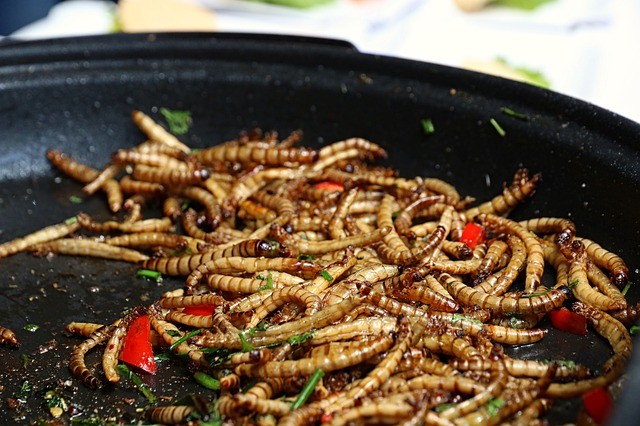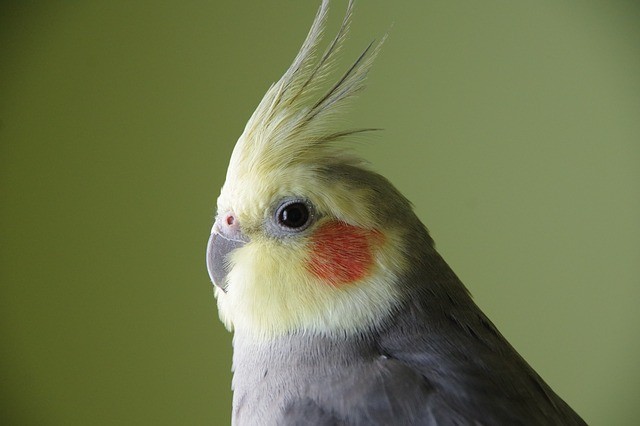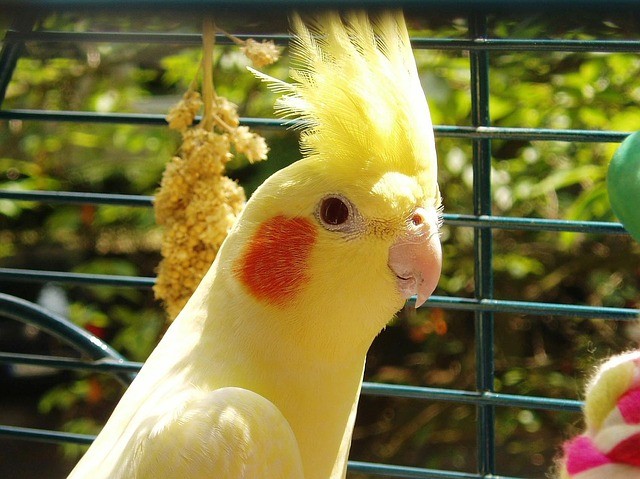Bird owners often focus on introducing vegetables, fruits and seeds into their cockatiel’s diet to provide vitamins and minerals your cockatiel needs to function optimally.
However, cockatiels also need protein in their diet and insects are often a good source of protein, therefore people often ask, can cockatiels eat mealworms?
The answer to this question is yes, cockatiels can eat mealworms. Moreover, mealworms are a good protein source. They make a great addition to a varied diet.
Through eating mealworms your pet will be exposed to a diet rich in calcium, vitamins and protein.

How Do I Prepare Mealworms for my Cockatiel to Eat?
Feeding your cockatiel mealworms can be a daunting task at first, especially, if you do not like creepy crawly insects.
Any uneasiness usually falls by the wayside when pet owners realize that mealworms can provide their bird with many nutritious benefits.
Your cockatiels health is often more important than any reservations you might have about handling mealworms.

To provide mealworms to your cockatiel you will have to locate a reputable source. The seller should have a reputation for quality as a mixture of inferior worms could be contaminated.
Substitute worms will not have the same health benefits as mealworms and contaminated worms could make your bird sick. You can find mealworms locally or online via Amazon.
Begin slowly when introducing mealworms to your cockatiel’s diet. Start by feeding your bird a small amount of this highly nutritious treat.
Take time to observe how your bird responds to consuming mealworms. Check to see if they enjoy consuming this food before trying to feed them larger portions.
You May Like This > Do Robins Like Mealworms?
There are two ways to introduce mealworms to your bird’s diet. You can introduce them alone or in combination with other foods. When starting out it may be better feed your cockatiel this food alone.
Feeding this food separately provides you with a better view of your pet’s reaction to this specific dinner menu item.
It is easier to identify and control the number of mealworms your cockatiel is consuming when you feed mealworms individually. You can begin the feeding process by cutting up the mealworms into smaller pieces.
If your cockatiel does not seem to have an affinity for mealworms you can try sneaking them into their diet. It is important to cut up the mealworms and place them among a medley of foods your bird already enjoys consuming.
A good option is to mix mealworms with a sweeter fruit like a strawberry. The smaller the mealworm pieces, the more likely your bird is just to eat the food rather than pick at it.
Are Mealworms Good for Cockatiels?
Mealworms are a healthy addition to any cockatiels diet, however, it should not be the only thing that your bird consumes. Your cockatiel, like most other living animals, needs a balanced diet.
No specific foods, including mealworms, should every make up the bulk of your pet’s diet.
Mealworms should be provided in moderation to your cockatiel at a rate of about 1-3 times a week. If you are only serving one or two mealworms every so often you can increase their frequency during the week.

Mealworms can provide your bird with needed protein and amino acids that are sometimes absent in a cockatiel’s seed rich diet. Minerals like calcium, iron, zinc and potassium can be obtained by consuming mealworms.
In addition, vitamins often found lacking in a cockatiels diet can be observed in mealworms.
Mealworms can also provide a multitude of B vitamins; including, B1, B2, B3, B5, B7 and B9. In addition, mealworms are a good source of vitamin D, vitamin E and Vitamin K.
Many of the above-listed vitamins are essential to a cockatiel’s overall health. Cockatiels need approximately 12 different vitamins to remain healthy.
When cockatiels receive all the minerals and vitamins they need they are more active, alert and their feathers look much healthier and shinier.